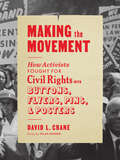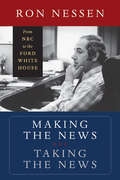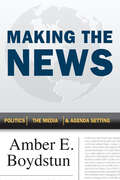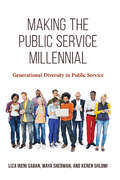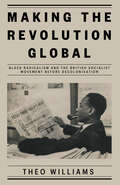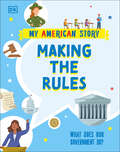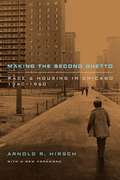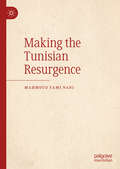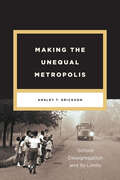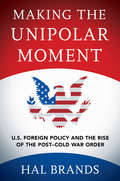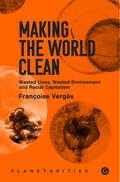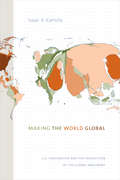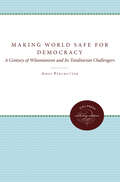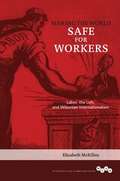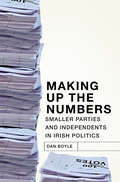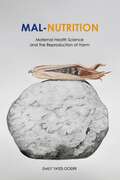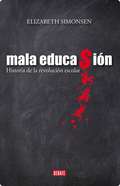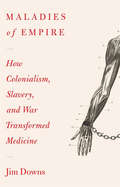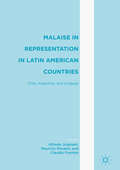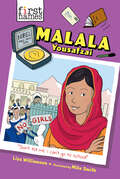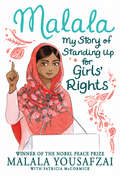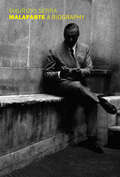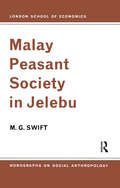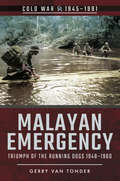- Table View
- List View
Making the Movement: How Activists Fought for Civil Rights with Buttons, Flyers, Pins, and Posters
by David L. CranePacked with over 200 color photos, this visual journey through Black history and the Civil Rights Movement is told through the objects—buttons, badges, flyers, pennants, posters, and more—designed by activists as tools to advance the fight for justice and freedom, offering a unique perspective on the Civil Rights Movement from Emancipation through the present day. From Reconstruction through Jim Crow, through the protest era of the 1960s and '70s, to current-day resistance and activism such as the Black Lives Matter movement, the material culture of the Civil Rights Movement has been integral to its goals and tactics. During decades of sit-ins, marches, legal challenges, political campaigns, boycotts, and demonstrations, objects such as buttons, flyers, pins, and posters have been key in the fight against racism, oppression, and violence. Making the Movement presents more than 200 of these nonviolent weapons alongside the stories of the activists, organizations, and campaigns that defined and propelled the cause of civil rights. It is a must-read for anyone seeking to learn about Black and African American history in the United States and about strategies to combat racism and the structures that support it.
Making the News, Taking the News: From NBC to the Ford White House
by Ron NessenFor fifteen years, Ron Nessen enjoyed an extraordinary career covering the major national events of the 1960s and '70s for NBC News, and later serving as White House press secretary to President Gerald R. Ford. Making the News, Taking the News remembers the events and personalities that dominated national politics during Nessen's career, bringing a hard-won perspective to those tumultuous times. Through an interweaving of countless incidents and personal anecdotes, Nessen builds a story that captures the true grit of closed-door politics. Off-the-record briefings and strategy sessions, as well as descriptions of experiences with Vietnam troops in the field, provide a vivid illustration of the life of an on-the-road reporter. At the heart of the book is Nessen's White House years, as the veteran reporter gives a valuable eyewitness account of events both behind the scenes and in front of the cameras that shaped and altered America during two critical decades.
Making the News: Politics, the Media & Agenda Setting
by Amber E. BoydstunMedia attention can play a profound role in whether or not officials act on a policy issue, but how policy issues make the news in the first place has remained a puzzle. Why do some issues go viral and then just as quickly fall off the radar? How is it that the media can sustain public interest for months in a complex story like negotiations over Obamacare while ignoring other important issues in favor of stories on “balloon boy?” With Making the News, Amber Boydstun offers an eye-opening look at the explosive patterns of media attention that determine which issues are brought before the public. At the heart of her argument is the observation that the media have two modes: an “alarm mode” for breaking stories and a “patrol mode” for covering them in greater depth. While institutional incentives often initiate alarm mode around a story, they also propel news outlets into the watchdog-like patrol mode around its policy implications until the next big news item breaks. What results from this pattern of fixation followed by rapid change is skewed coverage of policy issues, with a few receiving the majority of media attention while others receive none at all. Boydstun documents this systemic explosiveness and skew through analysis of media coverage across policy issues, including in-depth looks at the waxing and waning of coverage around two issues: capital punishment and the “war on terror.” Making the News shows how the seemingly unpredictable day-to-day decisions of the newsroom produce distinct patterns of operation with implications—good and bad—for national politics.
Making the Public Service Millennial: Generational Diversity in Public Service
by Maya Sherman Liza Ireni Saban Keren ShlomiMaking the Public Service Millennial explores how a new generation of public service employees affects the dynamics of continuity and change in public management and ethics. The book begins with the premise that Generation Y poses new challenges for public management, which will lead to changes in work-related values, rules, structures, and behaviors in the public service system. Will the soon-future leaders of today's public organizations pose new challenges for public management? How will this cohort cope with ethically-questionable behaviors? Given these questions, the potential strategic value of an empirical, cohort-based approach to ethical decision-making in the public service suggests interesting managerial implications for the effective incorporation of ethics into the management of public organizations. With implications for many types of organizations, and particularly for public sector organizations in democratic societies, managers across organizations should view generational differences not merely as a demographic variable, but as manifestations of broader social trends that may undermine established public management practices and organizational climates.
Making the Revolution Global: Black Radicalism and the British Socialist Movement before Decolonisation
by Theo WilliamsHow black radicals reshaped the British leftMaking the Revolution Global shows how black radicals transformed socialist politics in Britain in the years before decolonisation. African and Caribbean activist-intellectuals, such as Amy Ashwood Garvey, C.L.R. James, Jomo Kenyatta, Kwame Nkrumah and George Padmore, came to Britain during the 1930s and 1940s and intervened in debates about capitalism, imperialism, fascism and war. They consistently argued that any path towards international socialism must have colonial liberation at its heart. Although their ideas were met with opposition from many on the British Left, they convinced significant sections of the movement of the revolutionary potential of colonised peoples. By centring the entanglements between black radicals and the wider British socialist movement, Theo Williams casts new light on responses to the 1935 Italian invasion of Ethiopia, the 1945 Fifth Pan-African Congress, and a wealth of other events and phenomena. In doing so, he showcases a revolutionary tradition that, as illustrated by the global Black Lives Matter demonstrations of 2020, is still relevant today.
Making the Rules: What does our Government do? (My American Story)
by DKInspires young learners to explore America&’s government institutions through the nation&’s history and the experience of modern AmericansPart of an inspiring series of books that supports students in understanding government and civics in the United States, Making the Rules interweaves historical context, events, and personalities with the experiences of modern Americans to help students understand key social studies topics, including the origins of American institutions and values and their relevance to young people&’s lives today.The book explores government&’s impact on daily life, including raising money through taxation, security, protecting citizens&’ rights, organization, and providing services. The author also explains the role of other authorities such as state government. Historical topics and events include examples of different roles of government: security during wartime, providing services, and supporting people in need of help.
Making the Second Ghetto: Race and Housing in Chicago, 1940-1960
by Arnold R. HirschIn Making the Second Ghetto, Arnold Hirsch argues that in the post-depression years Chicago was a "pioneer in developing concepts and devices" for housing segregation. Hirsch shows that the legal framework for the national urban renewal effort was forged in the heat generated by the racial struggles waged on Chicago's South Side. His chronicle of the strategies used by ethnic, political, and business interests in reaction to the great migration of southern blacks in the 1940s describes how the violent reaction of an emergent "white" population combined with public policy to segregate the city. "In this excellent, intricate, and meticulously researched study, Hirsch exposes the social engineering of the post-war ghetto. "—Roma Barnes, Journal of American Studies "According to Arnold Hirsch, Chicago's postwar housing projects were a colossal exercise in moral deception. . . . [An] excellent study of public policy gone astray. "—Ron Grossman, Chicago Tribune "An informative and provocative account of critical aspects of the process in [Chicago]. . . . A good and useful book. "—Zane Miller, Reviews in American History "A valuable and important book. "—Allan Spear, Journal of American History
Making the Tunisian Resurgence
by Mahmoud Sami NabiThis book investigates the socioeconomic factors that triggered Tunisia’s "revolution for dignity” and the current issues and challenges facing its economy while suggesting mechanisms and instruments for their resolution. The author begins by analyzing the roots of the revolution and the post-revolution situation from a political sociology perspective and then diagnoses the Tunisian economy before and after the revolution and identifies the multidimensional binding constraints preventing it from escaping the middle-income trap. The book then explores the pillars of an inclusive development strategy that Tunisia should pursue. The emphasis is made on building inclusive institutions, developing a new social contract and reinventing the country's leadership. Beyond the institutional dimension, the author suggests innovative financial channels, discusses the strategy of a successful integration of the Tunisian economy in the global economy as well as the pillars of its transformation into a knowledge-based economy.
Making the Unequal Metropolis: School Desegregation and Its Limits (Historical Studies of Urban America)
by Ansley T. EricksonIn a radically unequal United States, schools are often key sites in which injustice grows. Ansley T. Erickson's Making the Unequal Metropolis presents a broad, detailed, and damning argument about the inextricable interrelatedness of school policies and the persistence of metropolitan-scale inequality. While many accounts of education in urban and metropolitan contexts describe schools as the victims of forces beyond their control, Erickson shows the many ways that schools have been intertwined with these forces and have in fact--via land-use decisions, curricula, and other tools--helped sustain inequality. Taking Nashville as her focus, Erickson uncovers the hidden policy choices that have until now been missing from popular and legal narratives of inequality. In her account, inequality emerges not only from individual racism and white communities' resistance to desegregation, but as the result of long-standing linkages between schooling, property markets, labor markets, and the pursuit of economic growth. By making visible the full scope of the forces invested in and reinforcing inequality, Erickson reveals the complex history of, and broad culpability for, ongoing struggles in our schools.
Making the Unipolar Moment: U.S. Foreign Policy and the Rise of the Post-Cold War Order
by Hal BrandsIn the late 1970s, the United States often seemed to be a superpower in decline. Battered by crises and setbacks around the globe, its post–World War II international leadership appeared to be draining steadily away. Yet just over a decade later, by the early 1990s, America's global primacy had been reasserted in dramatic fashion. The Cold War had ended with Washington and its allies triumphant; democracy and free markets were spreading like never before. The United States was now enjoying its "unipolar moment"—an era in which Washington faced no near-term rivals for global power and influence, and one in which the defining feature of international politics was American dominance. How did this remarkable turnaround occur, and what role did U.S. foreign policy play in causing it? In this important book, Hal Brands uses recently declassified archival materials to tell the story of American resurgence.Brands weaves together the key threads of global change and U.S. policy from the late 1970s through the early 1990s, examining the Cold War struggle with Moscow, the rise of a more integrated and globalized world economy, the rapid advance of human rights and democracy, and the emergence of new global challenges like Islamic extremism and international terrorism. Brands reveals how deep structural changes in the international system interacted with strategies pursued by Jimmy Carter, Ronald Reagan, and George H. W. Bush to usher in an era of reinvigorated and in many ways unprecedented American primacy. Making the Unipolar Moment provides an indispensable account of how the post–Cold War order that we still inhabit came to be.
Making the World Clean: Wasted Lives, Wasted Environment, and Racial Capitalism (Goldsmiths Press / Planetarities)
by Francoise VergesAn antiracist theory of cleaning.In Making the World Clean: Wasted Lives, Wasted Environment, and Racial Capitalism, Françoise Vergès examines the racial and gendered politics of wasting lands, bodies, and resources and the organized deprivation of clean water, shelter, and access to health services—in other words, the structural denial, along racial lines, of vital needs. Through 38 short sections, she looks at the social relations that have made cleaning into drudgery and into a racialized, gendered, poorly paid job that is nevertheless necessary for any society to function. She concludes with the proposition of a feminist, decolonial, antiracist, anti-patriarchal, and anti-capitalist politics of cleaning. Or, simply put, of &“decolonial cleaning.&”To Vergès, the structural denial of the elemental needs of women of color (sanitary pads, access to water, and privacy for basic washing), and why these needs are considered insignificant and trivial, shows how racism and class war are gendered. By examining the banal, the trivial, and the elemental, the author addresses cleaning as a necessity rather than the maintenance of a consumerist lifestyle, a condition of basic care of the body and the mind that is considered with indifference by racial capitalism, white environmentalism, and even, too often, by humanitarian organizations. She argues that by building &“life-affirming institutions,&” as Ruth Wilson Gilmore advocates, struggles against the whitening of cleaning create sites of freedom. &“Decolonial cleaning&” imagines cleaning as taking care of land, humans, plants, animals, and rivers, not seeking to discipline them or transform them into commodities or objects of conservation but cleaning as a practice dedicated to sustaining the living world.
Making the World Global: U.S. Universities and the Production of the Global Imaginary
by Isaac A. KamolaFollowing World War II the American government and philanthropic foundations fundamentally remade American universities into sites for producing knowledge about the world as a collection of distinct nation-states. As neoliberal reforms took hold in the 1980s, visions of the world made popular within area studies and international studies found themselves challenged by ideas and educational policies that originated in business schools and international financial institutions. Academics within these institutions reimagined the world instead as a single global market and higher education as a commodity to be bought and sold. By the 1990s, American universities embraced this language of globalization, and globalization eventually became the organizing logic of higher education. In Making the World Global Isaac A. Kamola examines how the relationships among universities, the American state, philanthropic organizations, and international financial institutions created the conditions that made it possible to imagine the world as global. Examining the Center for International Studies, Harvard Business School, the World Bank, the Social Science Research Council, and NYU, Kamola demonstrates that how we imagine the world is always symptomatic of the material relations within which knowledge is produced.
Making the World Safe for Democracy: A Century of Wilsonianism and Its Totalitarian Challengers
by Amos PerlmutterIn this interpretive study, Amos Perlmutter offers a comparative analysis of the twentieth century's three most significant world orders: Wilsonianism, Soviet Communism, and Nazism. Anchored in three hegemonical states--the United States, the Soviet Union, and Nazi Germany--these systems, he argues, shared certain characteristics that distinguished them from other attempts to restructure the international political scene. While Communism and Nazism were committed to imperial ideologies, Wilsonianism was inspired by an exceptionalist, peaceful, democratic, and free market world order. But all three were able to mobilize industrial, technological, and military resources in pursuing their goals. In the process of examining the democratic, Communist, and Nazi systems, Perlmutter also provides a framework for understanding U.S. foreign policy over the course of the century, particularly during the Cold War. He underscores the importance of ideology in establishing an international order, arguing that in the wake of the Soviet Union's demise, no system--not even Wilsonianism--can lay claim to the title of new world order.Originally published in 1997.A UNC Press Enduring Edition -- UNC Press Enduring Editions use the latest in digital technology to make available again books from our distinguished backlist that were previously out of print. These editions are published unaltered from the original, and are presented in affordable paperback formats, bringing readers both historical and cultural value.
Making the World Safe for Workers: Labor, the Left, and Wilsonian Internationalism (The Working Class in American History)
by Elizabeth McKillenIn this intellectually ambitious study, Elizabeth McKillen explores the significance of Wilsonian internationalism for workers and the influence of American labor in both shaping and undermining the foreign policies and war mobilization efforts of Woodrow Wilson's administration. McKillen highlights the major fault lines and conflicts that emerged within labor circles as Wilson pursued his agenda in the context of Mexican and European revolutions, World War I, and the Versailles Peace Conference. As McKillen shows, the choice to collaborate with or resist U.S. foreign policy remained an important one for labor throughout the twentieth century. In fact, it continues to resonate today in debates over the global economy, wars in Iraq and Afghanistan, and the impact of U.S. policies on workers at home and abroad.
Making up the Numbers: Smaller Parties and Independents in Irish Politics
by Dan BoyleAt a time when global politics is being reshaped, the accountability of those we put in power has never been more vital. In Making Up the Numbers, Dan Boyle, former chairman of the Green Party, applies his first-hand experience of non-traditional politics in Ireland to assess the role of minor parties in government and in coalition. This book is an essential contribution to our understanding of the ‘others’ vote in Irish politics.
Mal-Nutrition: Maternal Health Science and the Reproduction of Harm
by Emily Yates-DoerrA free ebook version of this title is available through Luminos, University of California Press’s Open Access publishing program. Visit www.luminosoa.org to learn more.Mal-Nutrition documents how maternal health interventions in Guatemala are complicit in reproducing poverty. Policy makers speak about how a critical window of biological growth around the time of pregnancy—called the "first 1,000 days of life"—determines health and wealth across the life course. They argue that fetal development is the key to global development. In this thought-provoking and timely book, Emily Yates-Doerr shows that the control of mothering is a paradigmatic technique of American violence that serves to control the reproduction of privilege and power. She illustrates the efforts of Guatemalan scientists, midwives, and mothers to counter the harms of such mal-nutrition. Their powerful stories offer a window into a form of nutrition science and policy that encourages collective nourishment and fosters reproductive cycles in which women, children, and their entire communities can flourish.
Mala Educacion: Historia de la Revolucion Estudiantil
by Simonsen Muñoz ElizabethEsta es la historia de cómo los escolares se organizaron utilizando la inteligencia y la valentía para decir basta y hacer oír su voz en un país que parecía sordo, ciego y mudo. La noticia dio la vuelta al mundo: cientos de miles de estudiantes se tomaban las calles y los colegios en Chile. Las manifestaciones más masivas desde el fin de la dictadura de Pinochet sorprendían al país, que respaldó las reivindicaciones de los alumnos por una educación laica, republicana y accesible a todos. Esta es la historia de cómo los escolares se organizaron utilizando la inteligencia y la valentía para decir basta y hacer oír su voz en un país que parecía sordo, ciego y mudo. Y es también una profunda investigación periodística que desvela en detalle cómo y por qué se ha fallado en las políticas públicas que redundan en una educación con alarmantes índices de estratificación social, sometida al lucro y con una calidad reprobable.
Mala Vida: A Novel
by Marc FernandezAlmodóvar meets Orwell in this acclaimed, fast-paced contemporary noir novel exposing the most shameful secrets of the Franco era.Present-day Spain, a time of economic crisis and resurgent populist nationalism. The radical right has just won the election after twelve years of Socialist rule. In the midst of this political upheaval, a series of murders is committed, taking place from Madrid to Barcelona to Valencia. The victims include a politician a real-estate lawyer, doctor, a banker, and a nun. There is no obvious connection between them. As the country prepares for a return to a certain moral order, radio crime reporter Diego Martin is trying to keep his head above water in anticipation of the expected media purge. When he decides to look into the first murder, he doesn't have the faintest clue that his investigation will lead far beyond his local beat and put his life at risk. For what he uncovers exposes the roots of a national scandal: the theft of babies from the victims of the Franco regime, crimes—never prosecuted—that were orchestrated by now well-connected citizens who will do anything to avoid exposure.
Maladies of Empire: How Colonialism, Slavery, and War Transformed Medicine
by Jim DownsA sweeping global history that looks beyond European urban centers to show how slavery, colonialism, and war propelled the development of modern medicine. Most stories of medical progress come with ready-made heroes. John Snow traced the origins of London’s 1854 cholera outbreak to a water pump, leading to the birth of epidemiology. Florence Nightingale’s contributions to the care of soldiers in the Crimean War revolutionized medical hygiene, transforming hospitals from crucibles of infection to sanctuaries of recuperation. Yet histories of individual innovators ignore many key sources of medical knowledge, especially when it comes to the science of infectious disease. Reexamining the foundations of modern medicine, Jim Downs shows that the study of infectious disease depended crucially on the unrecognized contributions of nonconsenting subjects—conscripted soldiers, enslaved people, and subjects of empire. Plantations, slave ships, and battlefields were the laboratories in which physicians came to understand the spread of disease. Military doctors learned about the importance of air quality by monitoring Africans confined to the bottom of slave ships. Statisticians charted cholera outbreaks by surveilling Muslims in British-dominated territories returning from their annual pilgrimage. The field hospitals of the Crimean War and the US Civil War were carefully observed experiments in disease transmission. The scientific knowledge derived from discarding and exploiting human life is now the basis of our ability to protect humanity from epidemics. Boldly argued and eye-opening, Maladies of Empire gives a full account of the true price of medical progress.
Malaise in Representation in Latin American Countries
by Alfredo Joignant Mauricio Morales Claudio FuentesThis edited volume examines malaise with democracy within three middle-income Latin American countries - Chile, Argentina and Uruguay. In particular, the book focuses on the gap within public opinion on democratic system within the context of crisis of representation and breakdowns of democracy. Based on a study using comparative and systematic survey data, the contributors of this volume provide a solid analysis on the state of democracy in three Latin American countries, whose lessons are useful for all types of democracy, in the north and the south.
Malala Yousafzai (First Names)
by Lisa WilliamsonMeet the young activist who stood up for her rights—and changed millions of lives Before Malala Yousafzai (b. 1997) became the youngest Nobel Prize laureate, she was a girl fighting for her education in Pakistan. Growing up, Malala’s father encouraged her to be politically active and speak out about her educational rights. When she did, she was shot by a member of the Taliban and the story received worldwide media coverage. Protests and petitions from around the world helped to pass an educational-rights bill in Pakistan, and Malala used this platform to continue her activism and fight for women’s rights. Inspiring and moving, Malala Yousafzai tells the story of one girl’s bravery in her fight for equal rights. It includes a timeline, bibliography, glossary, and index.
Malala: My Story of Standing Up for Girls' Rights
by Sarah J. Robbins Malala YousafzaiA chapter book edition of Nobel Peace Prize winner Malala Yousafzai's bestselling story of courageously standing up for girls' education. Malala's memoir of a remarkable teenage girl who risked her life for the right to go to school is now abridged and adapted for chapter book readers. Raised in a changing Pakistan by an enlightened father from a poor background and a beautiful, illiterate mother, Malala was taught to stand up for what she believes. Her story of bravery and determination in the face of extremism is more timely than ever. In this edition, Malala tells her story in clear, accessible language perfect for children who are too old for Malala's Magic Pencil and too young for her middle-grade memoir. Featuring line art and simplified back matter, Malala teaches a new audience the value of speaking out against intolerance and hate: an inspiring message of hope in Malala's own words.
Malaparte: A Biography
by Maurizio SerraA sweeping, definitive biography of the polarizing Italian writer whose infamous politics, relationship with Mussolini, and irrepresable knack for invention made him one of the most provocative artists and thinkers of his time.Curzio Suckert (1898–1957)—best known by his pen-name Malaparte—was not only a literary master but one of the mystery men of twentieth-century letters. The son of a cosmopolitan German businessman, his mother an Italian, Malaparte led a life that was intimately entwined from start to finish with the twentieth century's troubled history, and only recently has it become possible to begin to separate fact from the screen of fictions with which he continually surrounded himself.Diplomat and novelist Maurizio Serra tells the story of a precocious child who hurried to enlist in the French Army and endured the horrors of trench warfare in World War I. Taking up the pen of the journalist in the interwar years, Malaparte both allied himself and fell out with Mussolini, writing his provocative bestseller The Technique of the Coup d'Etat to popularise the lessons of the Bolshevik revolution and the fascist March on Rome before being sent into exile in provincial Italy. During World War II, Malaparte reported from the Eastern Front, joined forces with the occupying Allies after Mussolini's fall, and secretly wrote the first of his two masterpieces, Kaputt, a record of wartime enormities and atrocities that is as stylish as it is hellish. With The Skin, a black comedy about the American Army in Naples, Malaparte cemented a reputation for daring and disturbing originality. A polymath and shapeshifter—fascist, communist, a converted Catholic on his deathbed—a self-mythologizer on the move between society salons, the corridors of power, and the frontlines, Malaparte is a complex and fascinating subject.
Malay Peasant Society in Jelebu (LSE Monographs on Social Anthropology #Vol. 29)
by M. G. SwiftFirst published in 1939 and long out of print, this book remains unique as the only full and detailed account by a social anthropologist of a complete pagan Polynesian ritual cycle. This new single-volume edition omits some of the Tikopia vernacular texts, but includes a new theoretical introduction; postscripts have also been supplied to some of the chapters comparing the performances of 1928-9 with those witnessed by Professor Firth on his second visit to Tikopia in 1952. There is a specially written Epilogue on the final eclipse of the traditional ritual, based on a third visit by the author during the summer of 1966.
Malayan Emergency: Triumph of the Running Dogs, 1948–1960 (Cold War, 1945–1991)
by Gerry van TonderWhen the world held its breath It is 25 years since the end of the Cold War, now a generation old. It began over 75 years ago, in 1944long before the last shots of the Second World War had echoed across the wastelands of Eastern Europewith the brutal Greek Civil War. The battle lines are no longer drawn, but they linger on, unwittingly or not, in conflict zones such as Iraq, Somalia and Ukraine. In an era of mass-produced AK-47s and ICBMs, one such flashpoint was Malaya By the time of the 1942 Japanese occupation of the Malay Peninsula and Singapore, the Malayan Communist Party (MCP) had already been fomenting merdeka independence from Britain. The Japanese conquerors, however, were also the loathsome enemies of the MCPs ideological brothers in China. An alliance of convenience with the British was the outcome. Britain armed and trained the MCPs military wing, the Malayan Peoples Anti-Japanese Army (MPAJA), to essentially wage jungle guerrilla warfare against Japanese occupying forces. With the cessation of hostilities, anti-Japanese became anti-British, and, using the same weapons and training fortuitously provided by the British army during the war, the MCP launched a guerrilla war of insurgency.Malaya was of significant strategic and economic importance to Britain. In the face of an emerging communist regime in China, a British presence in Southeast Asia was imperative. Equally, rubber and tin, largely produced in Malaya by British expatriates, were important inputs for British industry. Typically, the insurgents, dubbed Communist Terrorists, or simply CTs, went about attacking soft targets in remote areas: the rubber plantations and tin mines. In conjunction with this, was the implementation of Maos dictate of subverting the rural, largely peasant, population to the cause. Twelve years of counterinsurgency operations ensued, as a wide range of British forces were joined in the conflict by ground, air and sea units from Australia, New Zealand, Southern and Northern Rhodesia, Fiji and Nyasaland.
